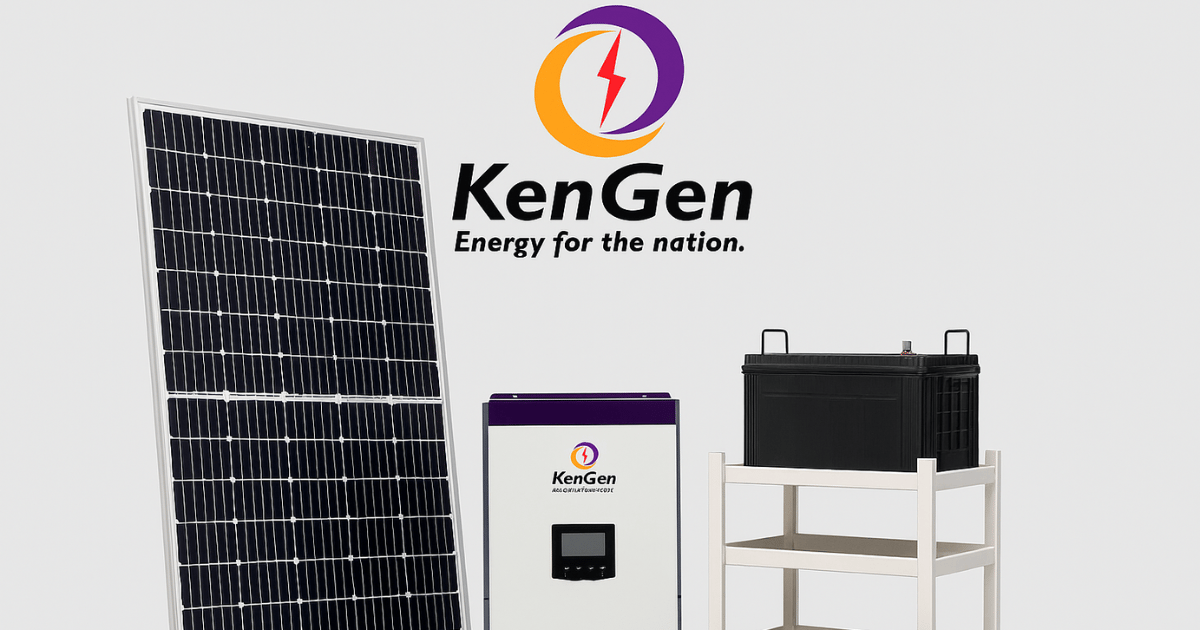- Renewables Rising
- Posts
- East African power giant ventures into solar manufacturing
East African power giant ventures into solar manufacturing

From the newsletter
Kenya’s leading power producer, KenGen, is set to start manufacturing solar panels, inverters and batteries after receiving government approval. The company aims to diversify revenues, cutting reliance on national utility Kenya Power by capitalising on Kenya’s surging demand for affordable and reliable solar energy.
Kenya’s installed solar capacity has grown to over 410 MW, with KenGen planning a 42.5 MW floating solar plant. The company seeks to tap into the local and regional demand for solar panels and kits to grow its revenues. Three-quarters of its revenues are currently generated from electricity sales.
Now more than ever, we are witnessing a trend in local manufacturing facilities. Kenya’s KenGen follows others like TOYO in Ethiopia, Art Solar in South Africa, and Auxano Solar Nigeria Limited in Nigeria, which are investing in local production for renewable energy components.
More details
The undisclosed cost plant in Kenya’s geothermal power hub of Olkaria will begin with solar photovoltaic (PV) module production and later expand to complementary components. KenGen aims to secure a transaction advisor by September 2025 to guide the project.
KenGen's revenue grew to approximately $430 million in the year ended June 2024, with roughly $315 million from Kenya Power, highlighting the dominance of its traditional business model. The need to diversify is clear, as KenGen is also pursuing new markets like carbon credit sales, targeted to yield about $32 million from 4.62 million Certified Emission Reductions. The manufacturing plant will also serve the broader East and Central African region, currently reliant on Chinese imports.
Despite vast solar resources, Africa provides only a fraction of its own solar hardware needs, leading to high costs and heavy reliance on global supply chains, primarily from China, which controls more than 80% of the world’s solar PV production. Local manufacturing by KenGen will reduce costs, enhance supply chain security, and encourage competitive pricing and quality through greater local content.
Power producers across Africa are increasingly finding themselves grappling with pressures to stabilise and diversify their revenue streams, especially as electricity tariffs face regulatory controls and the shift to renewables requires new forms of investment. Apart from KenGen, Nigeria’s Egbin Power Plc saw revenues stagnate at around $370 million annually by mid-2025. This is a common theme for many African IPPs and state-owned generators, as increases in installed capacity across the continent are not always matched by efficient offtake arrangements or timely tariff adjustments.
The decision to manufacture batteries along with panels and inverters is particularly insightful. Battery storage is critical for stabilising variable solar output and improving grid reliability, a major concern among African consumers. By offering a more integrated solution, KenGen is positioning itself not just as a producer but as a comprehensive clean energy provider, targeting a growing market gap.
Overall, solar manufacturing could significantly boost Africa’s economic future. Recent sector studies estimate it could raise continent-wide GDP by 6.4% by 2050 and create 8–14 million jobs through new roles in manufacturing, installation, and maintenance. For countries like Kenya, Nigeria, and Ghana, major energy importers, this shift would help stabilise budgets and support long-term growth as Africa embraces the clean energy transition.
Our take
No decision has ever made more sense for a power producer in Africa. KenGen is stepping in the right direction by venturing into solar manufacturing, showing both leadership and forward-thinking in an industry hungry for local content and resilience.
At the same time, this is a very risky move. Chinese firms already hold over 80% of Africa’s solar imports, and their dominance is likely to grow with continued investments and partnerships.KenGen should hedge by focusing on differentiated local solutions, leveraging regional policy support, and targeting niche markets underserved by imports.
The question of African manufacturing viability is no longer up for debate. KenGen’s ambition to include storage systems and inverters is as bold as any seen on the continent; Africa’s rapid demand growth, abundant resources, and improving special economic zones make it ripe for establishing a thriving local renewable energy industry.